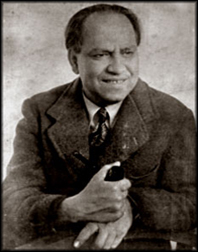 Muhammad Din Tasir
Muhammad Din Tasir
(Muḥammad Dīn Tās̲īr)
1902 – 1958
 Muhammad Din Tasir
Muhammad Din TasirMuhammad Din Taseer (Muḥammad Dīn Tās̲īr; 1902-58; also Muhammaddin Taseer) was born in Ajnala, Amritsar District, Punjab. He attended Foreman Christian College in Lahore, receiving an M.A. in English in 1926. He worked at Islamic College, Lahore, then resigned to take a position with the Department of Information of the state government. In 1934 he went to Cambridge where he took a Ph.D. in English in 1924 under the supervision of Sir Arthur Quiller-Couch (1863-1944). For his dissertation, “India and the Near East in English Literature from the Earliest Times to 1924,” he received his Ph.D. in 1936.
It was during this time that he came in contact with the Indian Progressive Writers’ Association as initiated by Sajjad Zaheer (1905-73) and Mulk Raj Anand (1905-2004), and helped draft and signed the group’s first manifesto presented at the 24 November 1934 meeting at the Nanking Restaurant, Bloomsbury. Tasir returned to India with an English wife, the former Christabel George, who took the name Bilqis, and he became principal of the newly established Anglo-Mohammedan College (MAO), Amritsar, where he was associated with Mahmuduzzafar (1908-54), his vice-principal, Dr. Rashid Jahan (1905-52), both authors associated with the highly controversial volume Angāre (Burning Embers), and Faiz Ahmed Faiz (1911-84). When Christabel/Bilqis’s younger sister, Alys George (1915-2003), visited just prior to the outbreak of World War II, she met and married Faiz. During the war Tasir served in various capacities in government service until 1947. In the following year he was appointed principal of Islamic College, Lahore, where he remained until his death.
He was looked upon for a period as the leader of the Urdu Progressive Writers’ Association in the Punjab, for it was through him that Sajjad Zaheer (1905-73) was able to meet Muhammad Iqbal (1977-1938), a friend of Tasir’s, and secure Iqbal’s important, crucial endorsement of the Progressive Movement. However, toward the end of his short life, he wrote less about Progressive subjects and more about personal topics, as shown in two of his best-known poems, “Landan kī ek shām” (A London Evening)* and “Sāʼe” (Shadows).* Progressive critics judged that he abandoned the Progressive fold entirely.
His writings on literature and art have been complied and edited by his brother-in-law, Faiz Ahmed Faiz, in two separate volumes as Naẕr-i tāsīr (Tasir’s Prose; 1963, 2009). His Urdu poetry, short stories, a novel, and plays also been posthumously edited and published, along with his Iqbal: The Universal Poet, ed. Afzal Haq Qarshi (1977) and Articles of Dr. M.D. Taseer, ed. Fakh Zaman et al. (2009).

